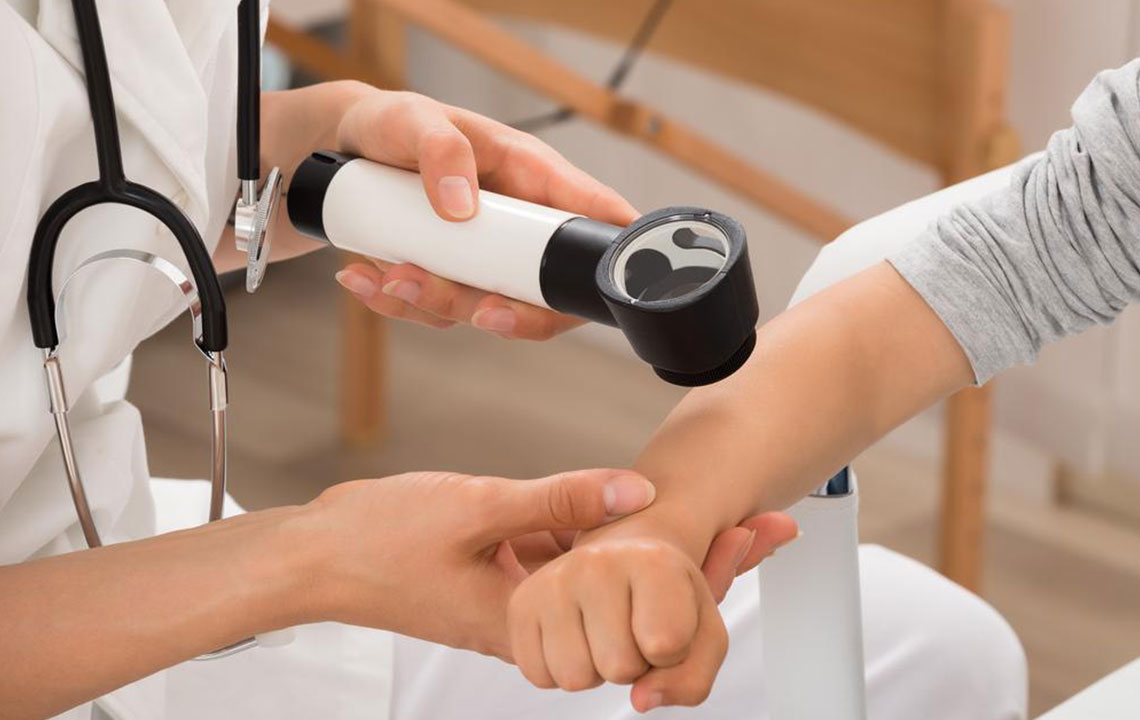Eczema – Symptoms, Complications, and Treatment Options
Eczema is a skin condition in which the infection causes inflammation and irritation of the epidermis (outer layer of the skin). Alternatively known as atopic dermatitis or atopic eczema, it comes under a group of skin diseases which results in allergic conditions. Eczema is a common condition which affects more than 3 million people in the country including infants, children, and adults and can last for a couple of months depending on the severity of the condition. The rash results in itching which cannot be controlled and commonly appears on your face, back of the knees, hands, feet or on your wrists.

Eczema causes the affected area to dry up and thicken. It can also affect pigmentation which causes discoloration in your skin highlighting the affected area particularly. Infants suffering from eczema will be affected severely since the rash can cause oozing, crustation of the skin on the face and scalp along with patches that can occur throughout the body. Causes of eczema are not known, but the condition has been linked to the body’s immune system. The immune system is designed to respond to various threats that might affect your overall wellbeing, thus keeping you healthy. However, an overactive response for tackling certain conditions can lead to the development of eczema skin.
Other causes can be linked to an allergic reaction caused by certain substances like coming into contact with coarse materials, exposure to household products which might contain chemicals in them like soaps and detergents. Even an allergic reaction to animal dander can aggravate the skin condition.
Noticeable symptoms of eczema
- Formation of reddish rashes which make the skin dry.
- Itching caused due to inflammation and dry skin, which will cause more discomfort at night.
- Patches on your neck, wrists, ankles, feet, hands, eyelids, elbows among other body parts.
- Visible raised bumps which might leak infectious fluids when scratched or itched.
- Scaly, dry skin which can get very sensitive due to the inflammation and itching.
Complications that might arise due to eczema
- Sleep problems: Since the condition gets aggravated at night, you might not be able to get a good nights sleep due to the irritation and scratching.
- Allergic dermatitis: The condition might not just stop at eczema skin and can cause allergic contact dermatitis.
- Skin infections: Itching of the skin will cause the crusty patches to break out that might lead to other possible skin infections.
- Neurodermatitis: Eczema skin can often lead to an aggravated condition called Neurodermatitis which is alternatively known as lichen simplex chronicus. This condition can cause the skin to become discolored, thick and leathery.
- Asthma and hay fever: Allergic reactions of eczema skin can lead to the development of asthma and hay fever, which is more common among children than adults.
Treatments for eczema
- Medications and therapy for eczema will include a number of options ranging from over the counter medications like hydrocortisone (available in a cream form), antihistamines which are available in both OTC as well as prescription options. The oral version of antihistamines is available over the counter. However, a doctors prescription might be needed for the more advanced ones.
- Self-care is another option when it comes to eczema skin treatments. Substituting your soaps and moisturizers for a milder version will help reduce the side effects of the skin condition. Taking baths will help cleanse the affected area killing the bacteria with the use of antibacterial bath products.
- Dry air can aggravate the skin condition which is why it will be a good idea to install an air humidifier at your place. This will relieve the stress on your skin and also speed up the recovery process along with the recommended course of eczema skin treatment.
- Other basic things you can try out at home include establishing a daily skin care routine after consulting with a skin care specialist and stick to it for maximum effect and relief from the symptoms. Stress management will also help to cope with the condition.
- Phototherapy is a skin treatment recommended in case of a severe eczema skin condition which involves the use of ultraviolet B light (UV) to help reduce the itching and inflammation.
Making a few lifestyle changes will certainly ensure that the skin condition doesn’t get aggravated. However, here are a few tips on managing eczema skin better.
- Eczema skin condition is worsened during the months of winter due to the lack of moisture. A dry air environment will just aggravate the skin condition. Use plenty of moisturizing creams to keep the infected area hydrated.
- Maintaining a healthy diet will is necessary, and certain foods should be avoided by people who are suffering from this skin condition.
- Dietary supplements are a good way to manage the symptoms. Supplements like omega-3 fish oil can help reduce the inflammation, in turn, can control your urge of itching the affected area.
- Eczema skin condition is affecting more and more people every year with stats rising in numbers, which is more the reason to stay educated and updated about the condition.

